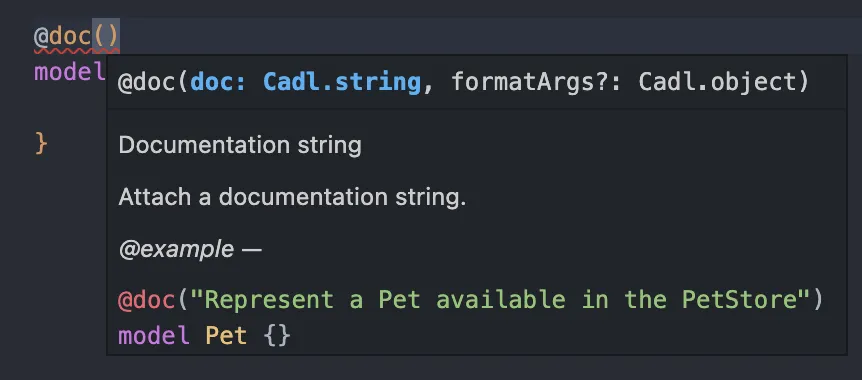December 2022
New features
Section titled “New features”Decorator signature help
Section titled “Decorator signature help”With the decorator signature extern dec added in previous release and the doc comment support added in this version the IDE is able to provide a signature help for decorators

New scalar type
Section titled “New scalar type”This release introduce a new scalar type meant to represent what were previously models with no properties actually representing an scalar value.
scalar uuid extends string;Emitter options interpolation and standardization
Section titled “Emitter options interpolation and standardization”Emitter options are not able to interpolate other values. See details
output-dir: {cwd}/generatedoptions: @typespec/openapi3: emitter-output-dir: {output-dir}/openapi3Breaking changes
Section titled “Breaking changes”TypeSpec Api Compiler Moved TypeSpec intrinsic types to a new Type scalar
Section titled “TypeSpec Api Compiler Moved TypeSpec intrinsic types to a new Type scalar”A new type has been introduced to TypeSpec in order to differentiate scalar from structured models types. Those new types can be declared using scalar and can extend another scalar using extends.
Change to TypeSpec intrinsic models
Section titled “Change to TypeSpec intrinsic models”All of TypeSpec intrinsic models have been updated to be scalar types instead of model. In most cases this shouldn’t affect a spec but if you are defining a custom model that is one of the intrinsic types you’ll have to update it
Before
model MyStr is string;After
scalar MyStr extends string;Migration script
Section titled “Migration script”The following script can be used to automatically migrate previous usages.
npx @typespec/migrateChange to Compiler API
Section titled “Change to Compiler API”Removed:
getIntrinsicModelName: Check it is a std type withprogram.checker.isStdType(type)and then use thetype.nameotherwise look fortype.baseScalarisIntrinsic: Check it is a std type withprogram.checker.isStdType(type)or just remove the check if goal was to omit intrinsic types from models.
Migration:
- Add a new switch to handle the new
scalartype - To resolve a scalar type, check if its a std type using
program.checker.isStdType(type) - If yes, do the same behavior has before with
getIntrinsicModelName - If not, call
scalar.baseScalarand repeat step 2.
API - Change to onEmit signature
Section titled “API - Change to onEmit signature”The signature of onEmit has been updated to accommodate for changes to the emitter options
Before
export function $onEmit(program: Program, options: MyEmitterOptions);Now
export function $onEmit(context: EmitContext);Access properties
| Before | Now |
|---|---|
program | context.program |
options | context.options |
options["output-dir"] | context.emitterOutputDir See details |
[TypeSpec] [Api] Emitter option output-dir renamed to emitter-output-dir
Section titled “[TypeSpec] [Api] Emitter option output-dir renamed to emitter-output-dir”The option has been renamed for all emitters as emitter-output-dir is now managed in the compiler
Before
emitters: my-emitter: output-dir: /path/to-output-dirNow
emitters: my-emitter: emitter-output-dir: {output-dir}/for-this-emitter# ^ can now reference the common output-dirChange to api
Section titled “Change to api”Before
export function $onEmit(program: Program, options: MyEmitterOptions) { const outputDir = options["output-dir"];}Now
export function $onEmit(context: EmitContext) { const outputDir = context.emitterOutputDir;}API > @typespec/compiler Multiple services per typespec specs are now allowed making a service accessor obsolete.
Section titled “API > @typespec/compiler Multiple services per typespec specs are now allowed making a service accessor obsolete.”The following functions have been deprecated
export function getServiceTitle(program: Program): string;export function getServiceVersion(program: Program): string;export function getServiceNamespace(program: Program): Namespace;export function getServiceNamespaceString(program: Program): string | undefined;export function setServiceNamespace(program: Program, namespace: Namespace);and replaced with
export interface ServiceDetails { title?: string; version?: string;}export interface Service extends ServiceDetails { type: Namespace;}
export function listServices(program: Program): Service[];export function getService(program: Program, namespace: Namespace): Service | undefined;export function isService(program: Program, namespace: Namespace): boolean;
export function addService(program: Program, type: Namespace, details?: ServiceDetails);Other changes to the service resolution:
- Title won’t be defaulted to
(title) - Version won’t be defaulted to
0000-00-00 - Service namespace won’t be defaulted to global namespace
| Before | To add support for multi serviceF |
|---|---|
getServiceNamespace(program) | listServices(program) to get all services |
getServiceNamespaceString(program) | getNamespaceName(service.type) is where service is getService(program, serviceNamespace) |
getServiceTitle(program) | service.title where service is getService(program, serviceNamespace) |
getServiceVersion(program) | service.version where service is getService(program, serviceNamespace) |
TypeSpec Directives can no longer be placed in certain contexts.
Section titled “TypeSpec Directives can no longer be placed in certain contexts.”For example, this is no longer valid:
model M<#suppress exampleT> {}And will now result in an error “Cannot place directive on template parameter”.
Move such directives up to the nearest statement, interface operation, model property, operation parameter, union variant, or enum member.
For the above example, that would be:
#suppress examplemodel M<T> {}Deprecations
Section titled “Deprecations”TypeSpec > @typespec/rest - @segmentSeparator is deprecated. The @actionSeparator decorator should be used instead.
Section titled “TypeSpec > @typespec/rest - @segmentSeparator is deprecated. The @actionSeparator decorator should be used instead.”Before
@autoRoutenamespace Things { @action @segmentSeparator(":") @put op customAction1( @segment("things") @path thingId: string, ): string;}After:
@autoRoutenamespace Things { @action @actionSeparator(":") @put op customAction1( @segment("things") @path thingId: string, ): string;}TypeSpec Deprecated uri being replaced by url
Section titled “TypeSpec Deprecated uri being replaced by url”Before:
model Server { endpoint: uri;}Now:
model Server { endpoint: url;}Config - Deprecated emitters property in the tspconfig.yaml
Section titled “Config - Deprecated emitters property in the tspconfig.yaml”The emitters property of the configuration file has been deprecated and replaced by 2 new properties making it consistent with the CLI
Before:
emitters: "@typespec/openapi3": output-file: openapi3.json other-emitter: trueAfter:
emit: - "@typespec/openapi3" - "other-emitter"options: @typespec/openapi3: output-file: openapi3.json